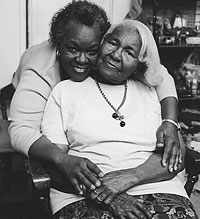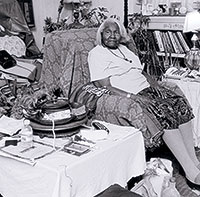Aging in Focus: Martha Peoples and Carrie Sager
By Melissa Springer
 Carrie Sager (seated) with Martha PeoplesMartha Peoples is an embraceable woman. Her warmth and her smile, her optimistic attitude about everything, make you want to run into her arms.
Carrie Sager (seated) with Martha PeoplesMartha Peoples is an embraceable woman. Her warmth and her smile, her optimistic attitude about everything, make you want to run into her arms.
She is a beautiful, 60-year-old woman who looks 40—only the wisps of gray in her hair suggest her age. She has soft skin and eyes that seem to know everything, pulling you with their own form of gravity. To be in her glance is to be in her care.
If she sees a wrong, you can be sure it will become a right. "I am a militant woman," Peoples says. As a girl, she left school on May 2, 1963, to participate in the Children's March in Birmingham. Without her family's knowledge, she rode with a friend and six other children from her hometown of Muscoda the dozen miles or so to Birmingham. After she arrived, Peoples had begun to walk toward the march site at 16th Street when her Uncle Fish, a cab driver, caught sight of her. He took Miss Martha back home—she was not one of the children in the infamous fire hose photographs.
After being a nurse for 20 years at UAB and 10 years at the VA Hospital, Peoples became the manager of the Muscoda Senior Center. The 20 or so seniors who come regularly find themselves in her arms for their daily hug. The center provides exercise, bingo, dominoes, and just plain old hanging out. Hot lunches are served every day. Peoples truly loves all her "people"; she calls herself "everybody's daughter." If someone doesn't show up for two days in a row, she goes over to their house. When they need a lift, Peoples takes her charges to the doctor.
 Carrie Sager
Carrie SagerThe former mining town that surrounds the center is poor, yet the village atmosphere still remains from the days when everyone who lived there worked in the mine. As Peoples says, "You take care of your own"—which means she often uses her own money to see to it that everyone has a hot lunch and can afford field trips.
Peoples began coming to the senior center to make sure her elderly father continued to participate in the community. That's when she met Carrie Sager, and after her father died, she and Sager became close friends. Years earlier, at age 80, Sager had cleaned the center to supplement her monthly Social Security check. She also had taken in sewing.
Now 94 years old and a widow, Sager is still powerful, strong, and lucid and is settled in her own home. She has seen World War I, World War II, the Cold War, the Korean War, the Vietnam War, the Gulf War, and the Iraq War. She knows there will never be a war to end all wars. She remarks that all her relatives who survived combat were never "quite right" after they came home. "They just kept to themselves, never did marry. Mostly didn't talk much."
Peoples and Sager are inseparable, and the bond between them is palpable. It permits honesty. Looking around Sager's cluttered house, Peoples observes, "She hasn't thrown anything away since 1951, the year she moved here." It's hard to get around the house, but her mementos are so compelling: They tell the story of her life.
There are clothes from the 1930s and '40s, dishes from the '50s, pictures of her youth, furniture imprinted by loved ones' bodies. So much life has been lived here. All the wars, the wild 1920s, Prohibition, speakeasies, Pearl Harbor, atomic bombs, Jim Crow laws, the civil rights movement, Brown v. Board of Education, the deaths of President Kennedy and Bobby Kennedy, Dr. King's assassination, the man on the moon, 9/11, the technology revolution, and a black man running for president. It's that last one, she says, that she couldn't believe would ever happen. During the civil rights movement, she cooked for the marchers. She met Dr. King once and watched the Selma-to-Montgomery March pass by on the highway near Prattville.
Life has not passed her by, but she is worried about others. The biggest concern among seniors today, Sager says, is the problem of shut-ins. "Old people are poor, most of their friends are gone, and they're depressed," she says. "We worry about them." Almost everyone else at the Muscoda Senior Center says the same thing—not "medications" or "health care" or "housing." The sense of community has not passed away yet.